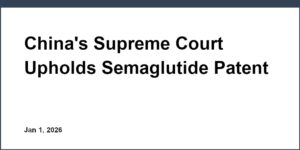Does UnitedHealthcare Pay for GLP-1? A Comprehensive Guide

Introduction
Did you know that nearly 42% of adults in the United States are classified as obese, according to the Centers for Disease Control and Prevention (CDC)? As obesity rates continue to climb, so does the demand for effective weight management solutions. With the recent advancements in medication, specifically glucagon-like peptide-1 (GLP-1) receptor agonists, many individuals are left wondering about their insurance coverage—particularly, does UnitedHealthcare pay for GLP-1 medications?
As we navigate the landscape of weight loss medications and insurance policies, it’s essential to understand how coverage works, what requirements must be met, and the potential implications of these medications on your health journey. In this blog post, we will explore the coverage options provided by UnitedHealthcare for GLP-1 medications, discuss the various medications available, and guide you through the steps to determine your eligibility for coverage.
By the end of this article, you will have a clearer understanding of how to navigate the complexities of insurance coverage for GLP-1 medications and gain insights that can empower your weight loss journey. So, let’s dive in and uncover the world of GLP-1 medications and UnitedHealthcare’s policies.
Understanding GLP-1 Medications
Before we delve into the specifics of insurance coverage, it’s vital to understand what GLP-1 medications are and how they function. GLP-1 is a hormone produced in the intestines that helps regulate appetite and blood sugar levels. Medications in this category mimic the effects of GLP-1, promoting weight loss and improving metabolic health.
Common GLP-1 Medications
Some of the most well-known GLP-1 medications include:
- Wegovy® (Semaglutide): Approved for weight loss, it is designed for adults with obesity or those who are overweight with a weight-related health condition.
- Ozempic® (Semaglutide): Primarily prescribed for type 2 diabetes management, it also aids in weight loss.
- Mounjaro® (Tirzepatide): A newer medication that targets both GLP-1 and GIP receptors, showing promise in weight management and diabetes control.
- Saxenda® (Liraglutide): Specifically approved for weight management, it is taken daily to help reduce hunger.
Understanding the differences between these medications can help you discuss options with your healthcare provider effectively.
Does UnitedHealthcare Cover GLP-1 Medications?
The answer to whether UnitedHealthcare covers GLP-1 medications is not straightforward. Coverage can vary significantly based on the specific UnitedHealthcare plan you have. Here, we will break down the general aspects of coverage related to GLP-1 medications.
General Coverage Guidelines
- Eligibility Criteria: For GLP-1 medications to be covered, UnitedHealthcare typically requires that patients meet specific eligibility criteria. This may include:
- A body mass index (BMI) of 30 or higher, or a BMI of 27 or higher with associated weight-related health conditions (such as type 2 diabetes, hypertension, or sleep apnea).
- Documentation of previous weight management efforts with lifestyle changes or other weight loss medications.
- Prior Authorization: As of January 1, 2024, UnitedHealthcare has implemented a policy requiring prior authorization for GLP-1 medications. This means that before coverage is granted, your healthcare provider must submit a request to UnitedHealthcare, demonstrating that the medication is medically necessary for your condition.
- Specific Plans: Coverage policies can differ based on whether you have an individual plan, employer-sponsored plan, Medicaid, or Medicare Advantage plan. For example, while some Medicare Advantage plans may cover GLP-1 medications, traditional Medicare usually does not cover weight loss medications.
How to Check Your Coverage
To determine if your specific UnitedHealthcare plan covers GLP-1 medications, follow these steps:
- Log into Your UHC Account: Access your UnitedHealthcare account online. Navigate to the pharmacy benefits section to view your plan’s formulary, which lists covered medications.
- Contact Member Services: Call the member services number found on the back of your insurance card. A representative can clarify your coverage details and any necessary steps for prior authorization.
- Consult Your Healthcare Provider: Discuss your interest in GLP-1 medications with your healthcare provider. They can assist in navigating the coverage process and submitting any required documentation.
The Importance of Documentation
When seeking coverage for GLP-1 medications, proper documentation is crucial. UnitedHealthcare often requires specific codes (such as ICD-10 codes for type 2 diabetes) to process claims effectively. Here’s how to prepare:
- Maintain Detailed Records: Keep a history of your weight management efforts, including previous diets and medications tried, as well as any health conditions that may warrant the use of GLP-1 medications.
- Collaborate with Your Doctor: Ensure that your healthcare provider is aware of the necessary documentation required by UnitedHealthcare for prior authorization. They can help compile the necessary evidence to support your case.
- Submit Promptly: Once your healthcare provider has gathered the required documentation, submit it to UnitedHealthcare as soon as possible to avoid any interruptions in your treatment.
Potential Challenges and Solutions
Navigating insurance coverage can sometimes be cumbersome. Here are some potential challenges you may face and how to address them:
1. Denied Claims
If your claim for GLP-1 medication coverage is denied, it’s crucial to understand the reasons behind the denial. Common reasons include:
- Lack of documentation supporting the medical necessity of the medication.
- Failure to meet the eligibility criteria, such as BMI requirements.
Solution: Review the denial letter carefully, contact UnitedHealthcare for clarification, and work with your healthcare provider to address any gaps in documentation.
2. Prior Authorization Delays
The prior authorization process may take time, causing delays in receiving your medication.
Solution: Start the prior authorization process early, ideally before your prescription is filled. This proactive approach can help minimize gaps in your treatment.
3. Coverage Limits
Some plans may have restrictions on the length of time you can be on GLP-1 medications or may require periodic reauthorizations.
Solution: Stay informed about your plan’s specific coverage limits and work with your healthcare provider for ongoing support and documentation.
Exploring Alternatives
If your UnitedHealthcare plan does not cover GLP-1 medications, or if you encounter significant barriers, there are alternatives to consider:
- Other Weight Loss Medications: Discuss other prescription medications with your healthcare provider that may be covered by your plan, such as phentermine or bupropion/naltrexone.
- Lifestyle Programs: UnitedHealthcare offers programs like Real Appeal, which provide resources for weight management, including coaching, workout plans, and more.
- Supportive Supplements: Consider including supplements like TrimRx’s GLP-1 Daily Support and Weight Loss Boost, which can complement your weight loss journey without the need for insurance coverage. These quick-access supplements are readily available and designed to support overall wellness while you explore your medication options.
Conclusion
Understanding whether UnitedHealthcare pays for GLP-1 medications is essential for anyone considering these options for weight management. While coverage can vary significantly based on plan specifics and eligibility criteria, being proactive in understanding your policy, preparing necessary documentation, and exploring alternative options can enhance your journey toward achieving a healthier lifestyle.
As you navigate this process, remember that you are not alone. We are here to support you every step of the way. Whether you’re considering prescription medications or looking for additional support through lifestyle programs and supplements, we believe that personalized, medically supervised care is crucial to your success.
If you are interested in exploring personalized weight loss solutions tailored to your unique needs, we invite you to take our free assessment quiz. This step will help determine your eligibility for our prescription weight loss medications, leading you one step closer to achieving your weight loss goals.
FAQ
What are GLP-1 medications?
GLP-1 medications are a class of drugs that mimic the action of the hormone GLP-1, helping to regulate appetite and blood sugar levels. They are commonly prescribed for weight management and type 2 diabetes.
How can I find out if my UnitedHealthcare plan covers GLP-1 medications?
You can log into your UnitedHealthcare account or contact member services for specific coverage details, including eligibility and prior authorization requirements.
What should I do if my claim for GLP-1 medication is denied?
Review the denial letter for reasons, contact UnitedHealthcare for clarification, and work with your healthcare provider to address any documentation gaps.
Are there alternatives to GLP-1 medications?
Yes, there are other weight loss medications, lifestyle programs offered by UnitedHealthcare, and supportive supplements available to aid in weight management.
How can I get started with GLP-1 medications?
Consult your healthcare provider about your interest in GLP-1 medications, and ensure you have the necessary documentation to support your case for insurance coverage.
By equipping yourself with this knowledge, you are taking an important step toward understanding your options and achieving your weight loss goals. Together, let’s embrace a healthier lifestyle!

Transforming Lives, One Step at a Time
Keep reading
Novo Nordisk shares drop as Alzheimer’s hopes for weight-loss drug fade
Novo Nordisk’s semaglutide failed to slow Alzheimer’s in large trials, prompting shares to fall and expert reactions.
China’s Supreme Court Upholds Semaglutide Patent for Novo Nordisk
China’s Supreme People’s Court upholds Novo Nordisk’s semaglutide compound patent, supporting IP protection.
Over 600,000 Californians Risk Losing Access to GLP-1 Weight-Loss Drugs
California’s Medi-Cal will stop covering GLP-1 weight-loss drugs for weight-loss-only prescriptions, effective Jan. 1, 2026.



